CORPORATE ACTION
Initial Take On Loop’s Circular Shopping Platform: Unimpressive
 Great Hopes
Great HopesWhen Loop launched in January at the 2019 World Economic Forum in Davos, it looked set to be a game changer. It already had many of the top CPG companies onboard – Carrefour, Coca-Cola, Danone, Mars, Mondelēz, Nestlé, PepsiCo, Procter & Gamble, Tesco, Unilever… – and press talked of how Loop offered a “revolutionary zero-waste e-commerce system” and planned to “eliminate plastic waste and save the planet.”
Founded by TerraCycle, a waste management company with operations in over 20 countries, Loop followed the milkman model, delivering product in reusable containers that it would collect and clean for reuse.
Consumers would shop for items on a dedicated e-commerce site, paying a refundable deposit for the container, with products delivered in a Loop tote that would be used to return containers. A zero-waste packaging system.
The Reality
Six months later it’s in pilot and first impressions aren’t great.
Trials are underway in a number of northeast US states (partnering with Kroger and Walgreen’s) and in Paris (with Carrefour). Additional pilots are scheduled, including later this year in the UK, with Tesco.
We looked at Loop’s offering and found a slow and stuttering start with very limited range, lots of out-of-stock and a lot of Loop own-brand (also often out-of-stock).
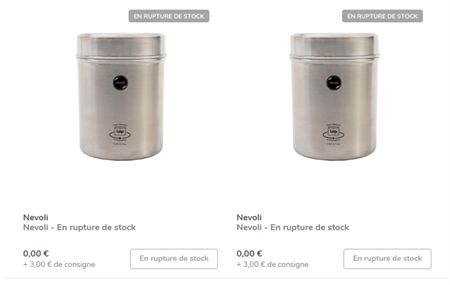 The US site (https://loopstore.com) lists 43 individual brands, but only 19 have any products. There are a total of just 81 products, with nearly half (40) from Puretto, Loop’s own brand in the US. Four products are out-of-stock, and three are “coming soon”.
The US site (https://loopstore.com) lists 43 individual brands, but only 19 have any products. There are a total of just 81 products, with nearly half (40) from Puretto, Loop’s own brand in the US. Four products are out-of-stock, and three are “coming soon”.The France store (https://maboutiqueloop.fr has 117 items listed, but 41 are from its own brand for the EU, Nevoli. There are 20 products out-of-stock (mostly from Nevoli) and 13 are “coming soon”.
The Nevoli “out-of-stock” items in fact look little more than placeholders, with just an image of the standard container, no product description, and no price.
There appear to be other missteps. The May 21, 2019 US press release announcing the launch of the pilot said consumers could visit loopstore.com or dedicated pages on the Kroger and Walgreen’s sites. The link to the Walgreen’s page works, but the link to the Kroger page errored.
Upscale pricing
Loop users face significant cost hurdles – a container deposit, premium pricing and costly shipping
Deposit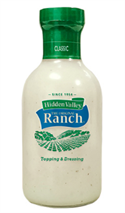
Each product carries a deposit that ranges from $1 to $15.75. The deposit is usually 10-20% of the combined charge but sometimes it’s a lot more. Häagen-Dazs - Chocolate Salted Fudge Truffle Non-Dairy costs $6.49, plus $5.00 for the deposit.
The Preserve - Everyday Tableware Bundle is $9.50 but add in the deposit and its $25.25 (luckily it’s currently out of stock).
Purchase 30 items and total deposit charges will likely be around $100 (yes, these are one-off but that’s still a sizable chunk).
Prices
Unit prices on Loop are substantially higher.
Hidden Valley Original Ranch Topping and Dressing on Loop is $3.89 (plus $1.00 deposit) for an 11.7 fl. oz. bottle (33c per fl. oz.). Walmart.com has a 24 fl. oz. bottle of pretty much the same thing for $3.88 (17c per fl. oz.), about half the unit rate.
Loop charges $9.50 (plus $1.50 deposit) for a 1.8 oz. jar of Silk Chili from Burlap & Barrel. Hop on the brand’s own store and you can by the same item (it seems) for $8.99.
On Loop, a 22 oz. canister of non-organic quinoa from Puretto is $7.00 (plus a $3.00 deposit), 32c per fl. oz. On walmart.com, a 16 oz. pack of organic quinoa is $3.42, 21c per fl. oz.
Shipping
Shipping costs are additional and one reviewer was shocked to find it was $20 for her order.
Truly Circular?
Surprisingly, Loop’s deliveries come with some single-use plastic. A US reviewer said plastic encountered included a plastic disposable lock-tie for the tote zip, plastic shrink wrap on the Puretto canisters, and the plastic bottle for the Puretto toasted sesame oil, which also had plastic shrink wrap. Of the items bought, only the Reinberger cashew butter had no plastic at all.
These plastic items can’t be recycled curbside and Loop recommends consumers put them in the tote to be recycled. Still, it feels like a basic error.
These missteps are discouraging. We remain convinced Loop is onto something and has the chance to build a valuable and less plastic intensive shopping platform but early signs aren’t encouraging. We will return again soon and let you know what we find but meanwhile, if you want a deeper look, let us know.
[Image Credit: © TerraCycle]
CORPORATE ACTION: Boots
Brown Paper Bags Will Replace Plastic Bags At Boots In The UK
 UK health and beauty retailer Boots will from next year phase out plastic bags, replacing them with unbleached brown paper ones, starting immediately with 53 stores across the country. It will also move to unbleached paper bags for prescriptions. It will charge for the new bags, even though they are not covered by the plastic bag tax. Instead, profits from the bags will go to the BBC Children in Need charity. Boots cites its own research to demonstrate the extent to which consumers support moves to address the problem of plastic waste. The bags are from Forest Stewardship Council certified recycled brown paper, easily recycled at home, and display the On-Pack Recycling Label. [Image Credit: © The Boots Company PLC]
UK health and beauty retailer Boots will from next year phase out plastic bags, replacing them with unbleached brown paper ones, starting immediately with 53 stores across the country. It will also move to unbleached paper bags for prescriptions. It will charge for the new bags, even though they are not covered by the plastic bag tax. Instead, profits from the bags will go to the BBC Children in Need charity. Boots cites its own research to demonstrate the extent to which consumers support moves to address the problem of plastic waste. The bags are from Forest Stewardship Council certified recycled brown paper, easily recycled at home, and display the On-Pack Recycling Label. [Image Credit: © The Boots Company PLC]
CORPORATE ACTION: Coca-Cola
Coca-Cola Great Britain Announces New Sustainable Packaging Initiatives
 100% recycled PET will be used in GLACÉAU smartwater bottles sold by Coca-Cola Great Britain, removing over 3,000 tonnes of virgin plastic each year, and the unit also expects to double to at least 50% the recycled content of all of its plastic bottles, across the 20 brands, by early next year. These moves should reduce the volume of virgin plastic it uses by over 23,000 tonnes each year. Coca-Cola is also replacing the green Sprite bottle with clear packaging to ease recycling into new bottles. General Manager of Coca-Cola Great Britain, Jon Woods, said that more needs to be done to address the problem, but more packaging needs to be collected and recycled to support the move towards higher rPET content. He said the company is supporting calls for “a well-designed deposit return scheme for drinks containers.” [Image Credit: © THE COCA-COLA COMPANY]
100% recycled PET will be used in GLACÉAU smartwater bottles sold by Coca-Cola Great Britain, removing over 3,000 tonnes of virgin plastic each year, and the unit also expects to double to at least 50% the recycled content of all of its plastic bottles, across the 20 brands, by early next year. These moves should reduce the volume of virgin plastic it uses by over 23,000 tonnes each year. Coca-Cola is also replacing the green Sprite bottle with clear packaging to ease recycling into new bottles. General Manager of Coca-Cola Great Britain, Jon Woods, said that more needs to be done to address the problem, but more packaging needs to be collected and recycled to support the move towards higher rPET content. He said the company is supporting calls for “a well-designed deposit return scheme for drinks containers.” [Image Credit: © THE COCA-COLA COMPANY]
Merlin And Coca-Cola Team Up To Offer Discounts On Attractions For Visitors Recycling Bottles
 Merlin Entertainments is offering a 50% discount at attractions in exchange for empty plastic bottles at dedicated reversed vending machines, in a campaign run in conjunction with Coca-Cola in the UK, extending a similar campaign run last year. The attractions include Alton Towers Resort, the LEGOLAND® Windsor Resort, Thorpe Park and Chessington World of Adventures, with new attractions added like SEA LIFE in Blackpool and London, and Warwick Castle Resort. Visitors to Thorpe Park will also be able to use Coca-Cola’s Freestyle machine, where people can pre-load money to a chip in a refillable cup. [Image Credit: © The Coca-Cola Company]
Merlin Entertainments is offering a 50% discount at attractions in exchange for empty plastic bottles at dedicated reversed vending machines, in a campaign run in conjunction with Coca-Cola in the UK, extending a similar campaign run last year. The attractions include Alton Towers Resort, the LEGOLAND® Windsor Resort, Thorpe Park and Chessington World of Adventures, with new attractions added like SEA LIFE in Blackpool and London, and Warwick Castle Resort. Visitors to Thorpe Park will also be able to use Coca-Cola’s Freestyle machine, where people can pre-load money to a chip in a refillable cup. [Image Credit: © The Coca-Cola Company]
CORPORATE ACTION: L’Oréal
L’Oréal Takes A Stake In Carbios

Carbios, a French company focusing on enzymatic bioprocesses to improve the lifecycle of plastics, has received investment from L’Oréal, through its recently-launched BOLD Business Opportunities for L’Oréal Development corporate venture capital fund. Carbios is developing technology to recycle a broader range of PET plastics and polyester fibers to create virgin-quality PET. Other companies in the Consortium include Nestlé Waters, PepsiCo and Suntory Beverage & Food Europe. [Image Credit: © CARBIOS]
CORPORATE ACTION: McDonald’s
McDonald’s UK & Ireland Makes Further Plastic Use Reductions
.jpg&width=125&height=70) The McFlurry’s ice cream range at McDonald’s in the UK and Ireland will be sold without the single-use plastic lids from September this year. McDonald’s will also use 100% renewable and recyclable cardboard packaging for all main meals and side salads, replacing the plastic containers. The cardboard will contain 50% recycled content. The company says that the changes will reduce plastic waste by nearly 500 million tonnes a year. Its global commitment is to use only renewable or recycled packaging by 2025 and it has started replacing plastic straws with paper straws. [Image Credit: © McDonald's]
The McFlurry’s ice cream range at McDonald’s in the UK and Ireland will be sold without the single-use plastic lids from September this year. McDonald’s will also use 100% renewable and recyclable cardboard packaging for all main meals and side salads, replacing the plastic containers. The cardboard will contain 50% recycled content. The company says that the changes will reduce plastic waste by nearly 500 million tonnes a year. Its global commitment is to use only renewable or recycled packaging by 2025 and it has started replacing plastic straws with paper straws. [Image Credit: © McDonald's]
CORPORATE ACTION: PepsiCo
PepsiCo Announces Changes To Eliminate 8,000 Tonnes Of Virgin Plastic
 From 2020, the LIFEWTR brand will use 100% recycled PET packaging. PepsiCo also announced that bubly sparkling water will stop using plastic packaging, and the AQUAFINA® water brand will offer aluminum cans for food service customers in the US. The company expects to eliminate over 8,000 tonnes of virgin plastic through these changes. [Image Credit: © PepsiCo, Inc.]
From 2020, the LIFEWTR brand will use 100% recycled PET packaging. PepsiCo also announced that bubly sparkling water will stop using plastic packaging, and the AQUAFINA® water brand will offer aluminum cans for food service customers in the US. The company expects to eliminate over 8,000 tonnes of virgin plastic through these changes. [Image Credit: © PepsiCo, Inc.]
CORPORATE ACTION: Procter & Gamble
P&G Is Looking To Lead Sustainability In The Consumer Goods Arena
 Procter & Gamble is aiming to raise its profile as a standard bearer for corporate sustainability, led by its CEO, David Taylor. Last year, he and P&G co-founded the Alliance to End Plastic Waste, a coalition aiming to invest $1.5 billion in appropriate schemes. He has also elevated the role of vice president of sustainability to chief sustainability officer and led the launch of a program called Ambition 2030, which aims to link creating value for shareholders and consumers with a positive impact on the environment and society, to develop P&G as a force for good and growth together. Ambition 2030 will help drive the transition of packaging for its major brands to be 100% recyclable or reusable, introduce more sustainable innovations, and develop other environment-focused initiatives.[Image Credit: © Procter & Gamble]
Procter & Gamble is aiming to raise its profile as a standard bearer for corporate sustainability, led by its CEO, David Taylor. Last year, he and P&G co-founded the Alliance to End Plastic Waste, a coalition aiming to invest $1.5 billion in appropriate schemes. He has also elevated the role of vice president of sustainability to chief sustainability officer and led the launch of a program called Ambition 2030, which aims to link creating value for shareholders and consumers with a positive impact on the environment and society, to develop P&G as a force for good and growth together. Ambition 2030 will help drive the transition of packaging for its major brands to be 100% recyclable or reusable, introduce more sustainable innovations, and develop other environment-focused initiatives.[Image Credit: © Procter & Gamble]
CORPORATE ACTION: Unilever
The Cif Cleaning Brand Unveils A Refill Option To Cut Plastic Use
.jpg&width=125&height=83) Unilever’s Cif household cleaning brand has launched Cif ecorefill. Consumers buy a trigger spray bottle and can then buy refills of 10x concentrate. The refill uses a quarter of the plastic needed for original product and attaches to Cif Power & Shine bottles. Using concentrate cuts the amount of water being transported by an estimated 97% and the number of trucks by 87%. The refill is fully recyclable if consumers remove the plastics sleeves, and the company is aiming for the refills and bottles to be made from 100% recycled plastic by the end of next year. [Image Credit: © Unilever]
Unilever’s Cif household cleaning brand has launched Cif ecorefill. Consumers buy a trigger spray bottle and can then buy refills of 10x concentrate. The refill uses a quarter of the plastic needed for original product and attaches to Cif Power & Shine bottles. Using concentrate cuts the amount of water being transported by an estimated 97% and the number of trucks by 87%. The refill is fully recyclable if consumers remove the plastics sleeves, and the company is aiming for the refills and bottles to be made from 100% recycled plastic by the end of next year. [Image Credit: © Unilever]
CORPORATE ACTION: Other
Swedish Startup Introduces The Veggio Reusable Bag For Fruit And Veg
Which? Study Finds UK Supermarkets Could Do Better To Help Improve Recycling Rates
 A study from Which?, the UK consumer campaigning group, found that almost half of packaging in items sold (primarily online) by the UK’s 11 supermarket chains can’t be easily recycled. Morrisons fared worst, and Tesco and Waitrose had the most items that could be recycled easily, but improvement was needed from all. It also found that recycling labels could be better, and 42% of packaging was either labeled incorrectly or not at all. Which? says that it’s not only about the use of plastic, but the type of plastic used: black plastic containers are not recyclable, and clear plastic bottles are more easily recycled than Tetra Paks. Many pizzas are still sold with non-recyclable polystyrene bases, and grease contamination of the cardboard packaging means that can’t be recycled either. Which? has made five key recommendations: make labeling clear and accurate; avoid unnecessary single-use plastic packaging; eliminate the use of black plastic PET trays; provide in-store plastic bag collection points; and offer products loose, where possible.[Image Credit: © Which?]
A study from Which?, the UK consumer campaigning group, found that almost half of packaging in items sold (primarily online) by the UK’s 11 supermarket chains can’t be easily recycled. Morrisons fared worst, and Tesco and Waitrose had the most items that could be recycled easily, but improvement was needed from all. It also found that recycling labels could be better, and 42% of packaging was either labeled incorrectly or not at all. Which? says that it’s not only about the use of plastic, but the type of plastic used: black plastic containers are not recyclable, and clear plastic bottles are more easily recycled than Tetra Paks. Many pizzas are still sold with non-recyclable polystyrene bases, and grease contamination of the cardboard packaging means that can’t be recycled either. Which? has made five key recommendations: make labeling clear and accurate; avoid unnecessary single-use plastic packaging; eliminate the use of black plastic PET trays; provide in-store plastic bag collection points; and offer products loose, where possible.[Image Credit: © Which?]
The Mr Muscle® Line In The UK Extends SC Johnson’s Expansion Of Refillable Options
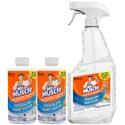
In August this year, UK consumers will see the first concentrated refill for SC Johnson’s Mr Muscle® cleaning products. The refills will be available on Amazon, and will allow consumers to add tap water to the concentrate in the reusable trigger bottle. The bottle should be refillable “dozens of times”. The Windex® concentrated refills were the company’s first foray into refillable products, in 2011, since when it has added brands including Pledge®, Shout® and Scrubbing Bubbles®. SC Johnson has also recently announced it will expand its concentrate options globally, including in Mexico, in July, and China and Japan, in September.[Image Credit: © S. C. Johnson & Son, Inc.]
Personal Care Startup By Humankind Offers Refillable Options For Your Bathroom

New York-based By Humankind, a personal care direct-to-consumer subscription startup, is looking to reduce its use of plastic by introducing refillable products, including a shampoo, deodorant and mouthwash. The refillable containers come with a lifetime guarantee, but can also be recycled. The company calls the refills “"kindfills", which are in pods made from biodegradable paper and shipped in envelopes made from recycled material. The shampoo (solid bar) and mouthwash (tablets) are heavily concentrated to reduce packaging. The deodorant is available unscented or with eucalyptus.[Image Credit: © By Humankind, Inc]
Rethinking Packaging To Reduce Plastic Use
 The author highlights efforts by 16 companies in the US that are attempting to address the need to reduce packaging. Those that will have an impact on plastic use include: A laminated plant-based compostable pouch for Alter Eco’s quinoa products; compostable wrappers for BOSS Food’s vegan bars; aluminum-lined recyclable boxes for water from Boxed Water is Better; GF Harvest’s GoPack recyclable and collapsible oatmeal bowls, which are flat when bought and can popped up to add hot water; compostable trays for the ready-to-cook seafood meals from Love the Wild, with a microwaveable version due later this year; Econic compostable films, using FSC-certified wood pulp and non-GMO corn, used for wrapping Loving Earth chocolate bars and superfood bars; and six-pack rings on Saltwater Brewery’s beers - 100% biodegradable and edible by animals, using Eco Six Pack Rings technology. [Image Credit: © pasja1000 from Pixabay]
The author highlights efforts by 16 companies in the US that are attempting to address the need to reduce packaging. Those that will have an impact on plastic use include: A laminated plant-based compostable pouch for Alter Eco’s quinoa products; compostable wrappers for BOSS Food’s vegan bars; aluminum-lined recyclable boxes for water from Boxed Water is Better; GF Harvest’s GoPack recyclable and collapsible oatmeal bowls, which are flat when bought and can popped up to add hot water; compostable trays for the ready-to-cook seafood meals from Love the Wild, with a microwaveable version due later this year; Econic compostable films, using FSC-certified wood pulp and non-GMO corn, used for wrapping Loving Earth chocolate bars and superfood bars; and six-pack rings on Saltwater Brewery’s beers - 100% biodegradable and edible by animals, using Eco Six Pack Rings technology. [Image Credit: © pasja1000 from Pixabay]
CAMPAIGNS, COMMITMENTS & NGOs
John Lewis & Partners Trails Recycling Initiative With Its Customers
 John Lewis & Partners, one of the UK’s leading department store chains, is testing a beauty packaging recycling scheme that gives its loyalty program members £5 discount on any beauty purchase if they return make-up and skincare packaging for recycling. It’s being conducted in partnership with waste management company, TerraCycle. The program is being called BeautyCycle, and TerraCycle will separate the empty containers into metals, plastics and fibers, to be recycled, composted or turned into plastic pellets for re-use in items like plastic benches or lumber. All packaging is being accepted except aerosol cans, and fragrance and nail varnish bottles. The retailer says it wants to make being sustainable as easy as they can for consumers. The scheme will be trialed from mid-June for a month in the 36 John Lewis stores with a full-line beauty service.[Image Credit: © John Lewis plc]
John Lewis & Partners, one of the UK’s leading department store chains, is testing a beauty packaging recycling scheme that gives its loyalty program members £5 discount on any beauty purchase if they return make-up and skincare packaging for recycling. It’s being conducted in partnership with waste management company, TerraCycle. The program is being called BeautyCycle, and TerraCycle will separate the empty containers into metals, plastics and fibers, to be recycled, composted or turned into plastic pellets for re-use in items like plastic benches or lumber. All packaging is being accepted except aerosol cans, and fragrance and nail varnish bottles. The retailer says it wants to make being sustainable as easy as they can for consumers. The scheme will be trialed from mid-June for a month in the 36 John Lewis stores with a full-line beauty service.[Image Credit: © John Lewis plc]
Reuse Models Through The New Plastics Economy Lens
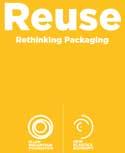 The Ellen MacArthur Foundation’s New Plastics Economy initiative published research it has conducted on how to convert some 20% of global plastic packaging into reuse models, and how this could represent a US$10 billion opportunity for business. The study looked at over 100 initiatives and interviewed more than 50 experts. The report identified six key benefits in reuse models: lower packaging and transportation from using refills in a compact form (e.g. concentrates and solids); more consumer control over the product; brand loyalty and customer retention through deposit and reward schemes; improved user experience; optimized operations, such as economies for scale in standardizing reusable packaging; and opportunities to gather information on consumer preferences by incorporating digital technologies (RFID tags, GPS, and sensors) in reusable packaging. The study also looked at four main reuse models (refill at home; refill on the go; return from home; and return on the go), and presented 69 examples, across a range of categories.[Image Credit: © ELLEN MACARTHUR FOUNDATION]
The Ellen MacArthur Foundation’s New Plastics Economy initiative published research it has conducted on how to convert some 20% of global plastic packaging into reuse models, and how this could represent a US$10 billion opportunity for business. The study looked at over 100 initiatives and interviewed more than 50 experts. The report identified six key benefits in reuse models: lower packaging and transportation from using refills in a compact form (e.g. concentrates and solids); more consumer control over the product; brand loyalty and customer retention through deposit and reward schemes; improved user experience; optimized operations, such as economies for scale in standardizing reusable packaging; and opportunities to gather information on consumer preferences by incorporating digital technologies (RFID tags, GPS, and sensors) in reusable packaging. The study also looked at four main reuse models (refill at home; refill on the go; return from home; and return on the go), and presented 69 examples, across a range of categories.[Image Credit: © ELLEN MACARTHUR FOUNDATION]
PACKAGING REDESIGNS
Estonian Startup Launches Water-Soluble Plant-Based ‘Honey Balls’
 Estonian startup Decomer has developed a plant-based biodegradable packaging material. The company is now incorporated in the US. Decomer’s first product is water-soluble packages for honey, called “honey drops”. They are capsules to be stirred into hot drinks. It will be available at retail and via a dispenser for food service. The company aims to develop a B2B business, selling packaging solutions to manufacturers and is developing packages that can be blended in smoothies, flavour packets that can be dissolved in water, and detergent packs that can be added to laundry. [Image Credit: © Decomer Technology Oü]
Estonian startup Decomer has developed a plant-based biodegradable packaging material. The company is now incorporated in the US. Decomer’s first product is water-soluble packages for honey, called “honey drops”. They are capsules to be stirred into hot drinks. It will be available at retail and via a dispenser for food service. The company aims to develop a B2B business, selling packaging solutions to manufacturers and is developing packages that can be blended in smoothies, flavour packets that can be dissolved in water, and detergent packs that can be added to laundry. [Image Credit: © Decomer Technology Oü]
100% Valvert rPET Bottle In Belgium Extends Nestlé’s Use of Recycled Plastic
 Nestlé Waters’ natural mineral water brand, Valvert in Belgium, has introduced a new bottle from 100% recycled PET, It’s the company’s first 100% rPET bottle in Europe. The brand launched a 100% 150cl rPET bottle and a 50% 50cl rPET bottle, with the aim of making the smaller bottle entirely from rPET by the end of the year. In 2018, Nestlé Pure Life launched 100% rPET bottles in North America, and the US spring water brand Poland Spring says it will convert its packaging to recycled plastic by 2021.[Image Credit: © Nestlé]
Nestlé Waters’ natural mineral water brand, Valvert in Belgium, has introduced a new bottle from 100% recycled PET, It’s the company’s first 100% rPET bottle in Europe. The brand launched a 100% 150cl rPET bottle and a 50% 50cl rPET bottle, with the aim of making the smaller bottle entirely from rPET by the end of the year. In 2018, Nestlé Pure Life launched 100% rPET bottles in North America, and the US spring water brand Poland Spring says it will convert its packaging to recycled plastic by 2021.[Image Credit: © Nestlé]
POLICY, REGULATION & LEGAL
New Bill Sets Out French Government Vision For A Circular Economy, But Not Everyone Is Convinced
 A new bill is to be introduced to the French parliament in September that sets out the country’s vision for a circular economy and an environmentally-sustainable society, by adopting a "repair, re-use, recycle" approach. As well as trying to eliminate built-in obsolescence in electrical and electronic goods, it would also bring in more Extended Producer Responsibility (EPR) schemes. A key proposal is the “consigne” scheme: a deposit of 10-15 centimes added when buying single-use drinks containers. It appears to cover only plastic and aluminium. When the scheme ran in the 1970s, it also applied to glass bottles. The bill also addresses the need to improve plastic recycling rates, in a country in which only 26.5% of household plastic is recycled. The government wants this to be 100% by 2025, even though experts believe it’s an unrealistic target, but there is no target for reducing plastic use. Critics say the proposals, and especially the consigne arrangements, will be expensive for consumers, local councils and small shopkeepers, and it will benefit drinks companies, who will have free access to PET for recycling. One estimate suggests that local councils will lose 250-300 million euros a year from handling recycling. [Image Credit: © evelynlo from Pixabay]
A new bill is to be introduced to the French parliament in September that sets out the country’s vision for a circular economy and an environmentally-sustainable society, by adopting a "repair, re-use, recycle" approach. As well as trying to eliminate built-in obsolescence in electrical and electronic goods, it would also bring in more Extended Producer Responsibility (EPR) schemes. A key proposal is the “consigne” scheme: a deposit of 10-15 centimes added when buying single-use drinks containers. It appears to cover only plastic and aluminium. When the scheme ran in the 1970s, it also applied to glass bottles. The bill also addresses the need to improve plastic recycling rates, in a country in which only 26.5% of household plastic is recycled. The government wants this to be 100% by 2025, even though experts believe it’s an unrealistic target, but there is no target for reducing plastic use. Critics say the proposals, and especially the consigne arrangements, will be expensive for consumers, local councils and small shopkeepers, and it will benefit drinks companies, who will have free access to PET for recycling. One estimate suggests that local councils will lose 250-300 million euros a year from handling recycling. [Image Credit: © evelynlo from Pixabay]
INNOVATION & TECHNOLOGY
A New First In Recyclable Toothpaste Tubes From Colgate
 Colgate-Palmolive announced a recyclable toothpaste tube that has been recognized by the Association of Plastic Recyclers. The company says it’s the first of its kind and represents over five years of work, and will be introduced through the Tom’s of Maine brand in the US next year, with a broader rollout to follow. The company has a 2025 target for 100% recyclable tubes as part of its 100% recyclable packaging commitment. Toothpaste tubes are typically made from a laminate of plastic sheets, often incorporating an aluminum layer. Colgate’s recyclable tube uses widely-recycled high-density polyethylene (HDPE). The plastic is rigid and not generally suited to ultra-thin laminate sheets, but the company’s packaging engineers found they could use different HDPE grade combinations to meet requirements. Although Colgate has got approval for the tube from the APR, it will also need to secure similar approval for other parts of the world. [Image Credit: © Colgate-Palmolive Company]
Colgate-Palmolive announced a recyclable toothpaste tube that has been recognized by the Association of Plastic Recyclers. The company says it’s the first of its kind and represents over five years of work, and will be introduced through the Tom’s of Maine brand in the US next year, with a broader rollout to follow. The company has a 2025 target for 100% recyclable tubes as part of its 100% recyclable packaging commitment. Toothpaste tubes are typically made from a laminate of plastic sheets, often incorporating an aluminum layer. Colgate’s recyclable tube uses widely-recycled high-density polyethylene (HDPE). The plastic is rigid and not generally suited to ultra-thin laminate sheets, but the company’s packaging engineers found they could use different HDPE grade combinations to meet requirements. Although Colgate has got approval for the tube from the APR, it will also need to secure similar approval for other parts of the world. [Image Credit: © Colgate-Palmolive Company]
OTHER NEWS
New Report Highlights The Cost Of Packaging To Scottish Households
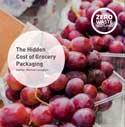 A new report from Zero Waste Scotland, an organization funded by the Scottish Government and the European Regional Development Fund, says that Scotland’s consumers buy groceries that use over 300,000 tonnes of single-use packaging annually. This represents a cost to the environment, but also to households – an estimated £600 million each year, much of which is hidden in product prices. This implies each household plays £250 (7% of the average grocery bill) a year for 130kg of single-use packaging. They also have to pay some £40 million each year to local authorities for waste management. The study estimates that grocery packaging contributes 13% of all household waste in the country, of which 89,000 tonnes (29% of grocery packaging) is plastic. The report concludes that this situation can be improved by price signalling, making shoppers aware of the price they pay for packaging. [Image Credit: © ZeroWasteScot 6@ZeroWasteScot zerowastescotland.org.uk]
A new report from Zero Waste Scotland, an organization funded by the Scottish Government and the European Regional Development Fund, says that Scotland’s consumers buy groceries that use over 300,000 tonnes of single-use packaging annually. This represents a cost to the environment, but also to households – an estimated £600 million each year, much of which is hidden in product prices. This implies each household plays £250 (7% of the average grocery bill) a year for 130kg of single-use packaging. They also have to pay some £40 million each year to local authorities for waste management. The study estimates that grocery packaging contributes 13% of all household waste in the country, of which 89,000 tonnes (29% of grocery packaging) is plastic. The report concludes that this situation can be improved by price signalling, making shoppers aware of the price they pay for packaging. [Image Credit: © ZeroWasteScot 6@ZeroWasteScot zerowastescotland.org.uk]

